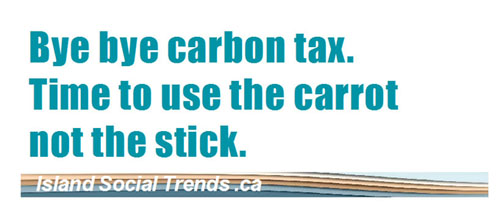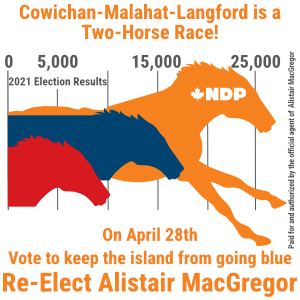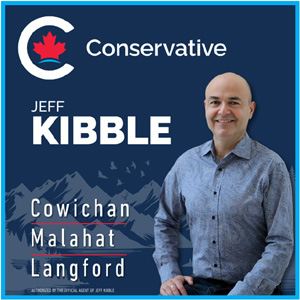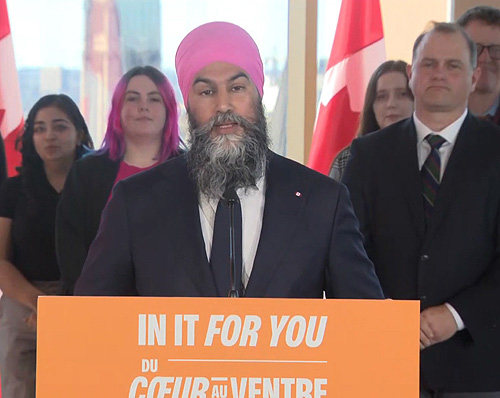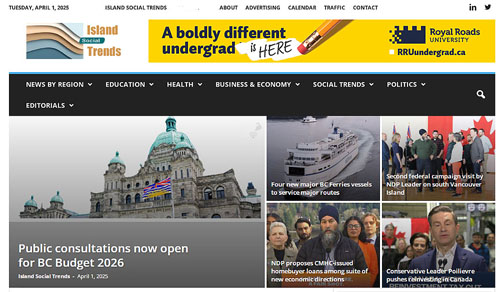Wednesday April 2, 2025 | VICTORIA, BC [Posted at 1:46 am PT | Updated 5 pm]
POLITICAL ANALYSIS by Mary P Brooke | Island Social Trends
The consumer carbon tax is now in the dustbin as the Canadian federal election grinds forward through a range of things that have worked and not worked in Canada over the past several years.
The consumer carbon tax worked until it didn’t. Arguably it was the downfall of Trudeau’s chances, after Poilievre hammered home about ‘axe the tax’ for so long. Carney may save the ship but a lot of damage was done.
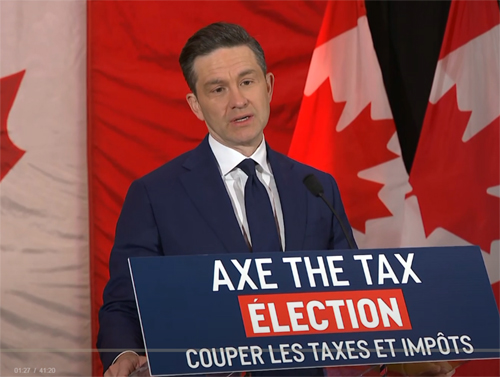
For some reason the stick was chosen over the carrot for trying to motivate households and businesses to reduce the carbon footprint of their lives.
But people still had to heat their homes and drive to work. Not everyone could afford transition to a more efficient home heating source or an electric vehicle.

Adding a tax burden to consumers on their home heating bill or at the gasoline pump was heavy-handed and unimaginative. It presumed that people had options while increasing their cost of living. But the issue seemed to big to grapple with and people paid it for years; it gave fuel to the Conservatives with their ‘axe the tax’ campaign momentum.
Yes, millions of low-income Canadians received a carbon tax rebate from the federal government (and from provinces like BC where the carbon tax was levied). This was a welcome bit of financial relief for people who live paycheck to paycheck; for some it meant not going over the brink on that month’s financial obligations. This is going to really hurt some households in ways that are dire. The next federal government will need to quickly deal with how to keep sustaining these lowest income households.
Toward the end of his time in office, former Prime Minister Justin Trudeau probably was hearing from disgruntled middle-income earners who were not getting the much lauded carbon tax rebate. There is no other reason for having launched that two-month holiday from GST on a range of consumer goods over Christmas 2024 and into the new year; that program did not help the low-income folks of whom many would not have had disposable income to take advantage of the short-term savings.
The carbon tax was touted by the federal and many provincial governments as the responsible thing to do, thinking that a cost pressure would motivate greener choices by consumers and businesses. In most cases it was just a burden because politicians had become so out of touch with the real affordability issues of many Canadians who fall short of achieving a stable middle-class living.
Canadian household debt is at its highest level ever. That statement has been true for years, as the household debt level continues to worsen. It’s not that people are reckless spenders. Many people use credit for the basics including topping up rent, getting enough groceries, or paying for medications. This is unsustainable.
In this current federal election the two large parties — Liberals and Conservatives — are coming up with various ideas and promises for rejigging or revamping the economy. Some of these ideas give evidence of some thought in new directions. Most of this revisionary urgency has come in response to the tariff threat (application) by the United States. All of a sudden in recent weeks the idea of dropping all inter-provincial trade barriers is alive among provincial premiers and Liberal Leader Mark Carney has coined the phrase ‘one economy not 13’. Ideas for keeping investment funds within Canada has been suggested by Conservative Leader Pierre Poilievre.
NDP Leader Jagmeet Singh started off his campaign with how the Employment Insurance economic safety net needs an overhaul. That quickly got diluted down to a variety of messages about supporting workers. But fresher ideas are coming from the left of the political spectrum, whose hope of bringing them to the floor of the House of Commons relies on getting enough seats to apply political pressure on the next government (as was done in the 43rd and 44th parliaments, generally with success for the NDP between 2020 and 2023).
Lesson from the consumer carbon tax … the stick doesn’t work anymore. Go for the carrot. Use honey not vinegar. Shift to strategic public education about the climate crisis so that people make their own choices to go green. That worked with the shift to residential and industrial recycling which has now been in place for over 30 years.
People are likely not wrong to think that the Liberal government used the consumer carbon tax as a mechanism for shifting wealth to the most in need. In that respect it was very helpful to many households. But tying that sort of financial support to the lowest income households should not have been disguised within the issue of lowering carbon emissions.
Canadian politicians need to be honest and brave and find other ways to adapt the economy so that millions of people don’t continue to struggle for survival; fewer and fewer people are able to truly thrive in this economy. This economic hardship prevents a society from blossoming in its best ways.
The biggest source of environmental pollution is from industry and manufacturing. That’s where the pressure should continue to be applied. If tax pressures are still what government thinks will work in that regard, so be it. But incentives (i.e. bonuses for making investments in greener processes and technology) are probably better than imposing taxes.
All of this speaks to how Canadians needs a mindset of growth and prosperity from their federal government, not using tax measures to herd people into financial difficulty. Liberal Leader Mark Carney is talking all about economic reform; while broad in scope, the simple idea of significant economic reform it is the sole ticket for Liberal success in this federal election.
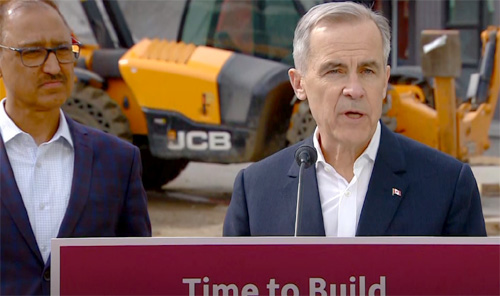
Hopefully everyone hopes for opportunities to choose a health environment with clean air and fewer contributions to global warming. Most individuals and households do their part, they have listened to the tune and are following the beat. It’s time for governments to trust the people and successfully motivate the industrial sector, each to do their part.
===== RELATED:
NEWS SECTIONS: CANADIAN FEDERAL ELECTION 2025 | CONSERVATIVE PARTY | CANADA NATIONAL | BUSINESS & ECONOMY


